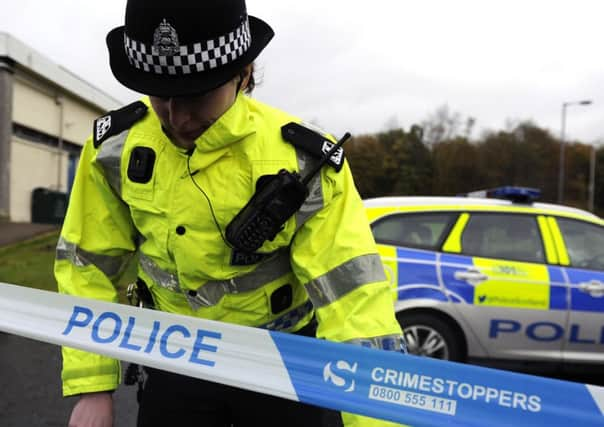Brian Wilson: Laying bare Scotland’s quango state


IN SPITE of its own best efforts, the Scottish Police Authority finds itself caught in the headlights, and it is not a pretty sight. Who are these people, Scotland is beginning to ask, and how do they come to be there?
The answers are instructive, not only about the SPA but also, more widely, of how Scottish public life is being refigured to achieve centralised control and maximise political acquiescence – objectives never far from Nationalist hearts.
Advertisement
Hide AdAdvertisement
Hide AdYesterday, the SPA board was cajoled into a hearing about stop-and-search powers. This followed an enterprising piece of journalism which eked out statistics the SPA did not hitherto believe worthy of public scrutiny or comment. We learned that, within a 13-month period, there were 640,699 stop-and-search incidents in Scotland, which does seem startling. One in seven yielded a “positive” outcome. Initial figures, since reviewed, showed almost 400 involved children under 12, which is several times more than the Metropolitan Police thought necessary in Greater London.
Political indignation met with a sharp rebuke from the Scottish Police Federation, which defended the use of stop-and-search and accused critics of naivety if they think some children under 12 are not capable of illegal acts and might even need a little protection from themselves and errant parents.
More fundamental points were raised in the open letter from Calum Steele, chief executive of the federation, to MSPs. Police Scotland, he said, “has to carry much of the responsibility for hostility to stop-and-search” because “the numbers-driven target approach was ill-conceived and resulted in attention being drawn away from crime protection and detection”.
That is a trenchant criticism of policing priorities – but where did that approach come from? Well, it came from the minister who set up Police Scotland and the Chief Constable he appointed, Sir Stephen House, while the quango Kenny MacAskill put in place, the SPA, remained silent and sidelined.
At this point, it is worth remembering what the SPA replaced. Supervision rested with regional police boards containing elected councillors. They stayed clear of operational matters, while chief constables respected both their own accountability and board members’ responsibility to the wider public. Local issues and sensitivities were well understood.
There was a good case for combining some operational efforts, to pool resources and expertise. But organisational reform acted as cover for something more fundamental – the dismantling of that well-tried system of local, arms-length accountability and replacing it with a national police force, close to political control and nominally supervised by a quango.
As Calum Steele’s letter states: “The greatest lesson of all must stem from the historic warnings that a single police service could become subject to political interference.” That is what has happened.
The targets-driven approach is politically driven. The fiasco over armed police stemmed from the collapse in accountability. The Chief Constable became a political figure by acting as ministerial cheer-leader, notably over the Offences at Football Grounds Act and abolition of corroboration. Now we have open dispute between Holyrood ministers and the body representing police officers.
Advertisement
Hide AdAdvertisement
Hide AdThe SPA board has drawn attention to itself, though sadly not through a reputation for vigilant supervision. Instead, it has caused understandable offence, not least among police officers, that the chairman, Vic Emery, claimed for attending funerals of those killed in the Clutha tragedy. Mr Emery is on £90,000 a year for his part-time role – quangoteers cost a lot more than councillors. Another SPA board member, Graham Houston, attended a Holocaust Memorial service in that role rather than as a councillor and claimed accordingly. One wonders, even more than before, why this quango stuffed with ministerially anointed individuals was allowed to replace a system founded on democratic accountability which worked pretty well.
In response to media interest in other quango roles these people occupy, “a spokesman” posted a statement protesting that “many of the ‘additional jobs’ SPA members are engaged in are actually voluntary unpaid roles … It is entirely misleading to make public references to individual members without being transparent about what constitutes paid roles and what are unpaid roles”.
The author clearly lacked a sense of irony since, while complaining about lack of transparency, the statement omitted to clarify the “paid roles” that SPA board members do indeed occupy. I easily found ten quango jobs within the gift of Scottish ministers shared among SPA board members – the people entrusted with holding to account the national police force created by the same ministers who keep the appointments flowing.
Jeane Freeman, an SPA board member and a queen of the Scottish quango circuit, holds three ministerially appointed posts with remuneration of around £50k a year. The Scottish Government website coyly acknowledges that Ms Freeman “was involved in support for independence during the referendum campaign”. The inaccuracy lies in the past tense since Ms Freeman continues to tour the studios in the same role.
How, according to any code of practice for public office, can people appointed to represent the public interest also act as public advocates for the political agenda of the politicians who have appointed them? Answer – they can’t and, irrespective of what opinions they hold, should not be allowed to.
The Scottish quango system is a disgrace in which a few individuals flit from one post to the next through political patronage. Mr Houston, of Holocaust expenses fame, is an SNP councillor who is also chairman of the Scottish Qualifications Authority. Ian Ross flits between the SPA role and chairmanship of Scottish Natural Heritage, and so the magic circle continues. Polymaths one and all!
If Holyrood had an independent committee system, it would be asking searching questions about Scotland’s quangos in general and the SPA in particular. Since that system is also under centralised political control, there is as little chance of that happening as there is of the Scottish Police Authority voting for its own well-earned disbandment.